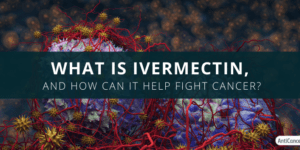When facing cancer, you want to use every cancer-fighting tool available. Among different strategies, taking repurposed prescription drugs like mebendazole has gained popularity.
“Off-label” drug use is when a medication is prescribed for purposes other than the approved uses described in the drug’s official Food and Drug Administration (FDA) label. Healthcare providers can legally prescribe medications off-label for their patients if they decide the potential benefits outweigh the risks.
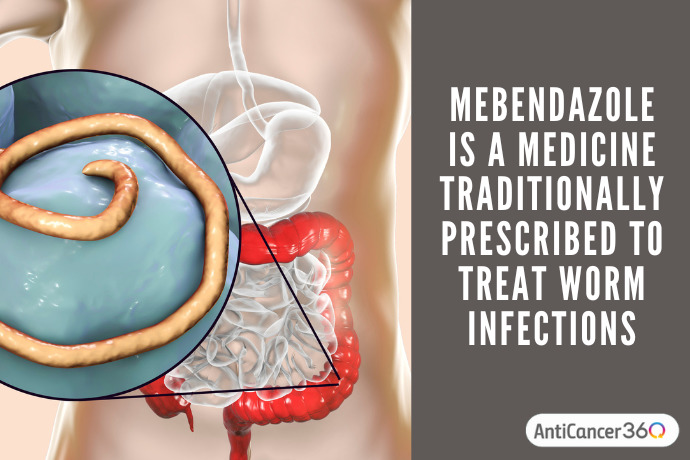
One advantage of repurposing or repositioning older drugs like mebendazole for cancer is their long track records and well-established safety profiles. Their risks, dosage limits, and interactions are well known. This is a potential advantage over newer cancer drugs whose short-term and long-term risks aren’t entirely known.
So, in today’s post, we’ll summarize what recent research shows about mebendazole and its potential anti-cancer effects. We’ll also answer frequently asked questions about mebendazole, such as the safety, dose, precautions, etc.
Mebendazole vs. Fenbendazole for Cancer?
We get a lot of questions about a similar drug, fenbendazole. Mebendazole and fenbendazole belong to the same class of drugs: benzimidazole anthelmintics (also known as dewormers). While mebendazole is a prescription drug approved for use in humans, fenbendazole is a veterinary drug used as a dog dewormer [1].
In an upcoming blog post, we’ll discuss fenbendazole and its potential anticancer effects.
What is Mebendazole?
Mebendazole is a medication traditionally used to treat parasitic infections, such as pinworm and roundworm. Here is a quick summary of basic facts about mebendazole [2],[3]:
- Brand names: Vermox, Enverm
- Generic available: Yes
- Drug form: Chewable tablet
- Classification: anthelmintic (also known as dewormer)
- Status in the U.S.: Prescription (Rx)
- Initial FDA approval: 1974
Mebendazole is one of several antimicrobial drugs repurposed for potential anticancer benefits. Other examples are ivermectin, hydroxychloroquine, mefloquine, and niclosamide. Some of these medications kill parasites by binding to specific targets on the cell surface, leading to cell death—one of several potential mechanisms implicated in how they affect cancer cells.
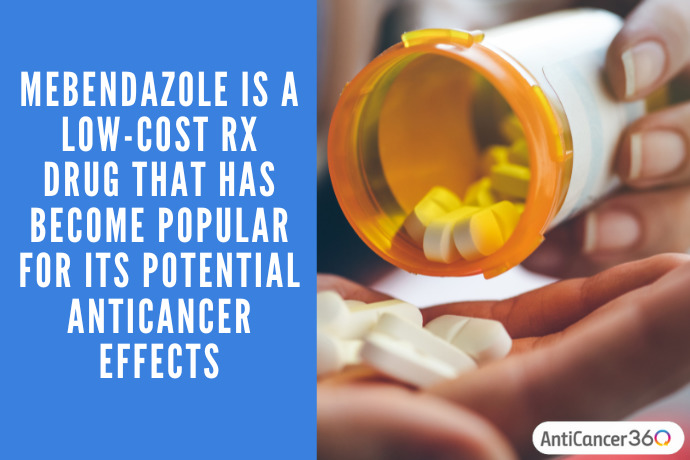
Further, mebendazole is one of four repurposed drugs recommended in the popular Care Oncology Clinic Protocol [4],[5]:
- Metformin, a diabetes medication
- Doxycycline, an antibiotic
- Atorvastatin, a cholesterol-lowering drug (For more information about a natural alternative to statins, see this article about red yeast rice.)
Mebendazole is thought to have anticancer benefits in conjunction with the above medications. Specifically, studies have suggested that mebendazole interrupts various molecular processes involved in cell division to help stop or slow cancer cell growth [6].
Let’s take a closer look at mebendazole’s anti-tumor effects.
Potential Anticancer Mechanisms of Mebendazole
Evidence has shown that mebendazole exerts anticancer action through a combination of effects. The drug is thought to inhibit or block tubulin, a protein involved in cell movement and division. Mebendazole selectively binds to tubulin, preventing the protein from functioning. This may keep cancer cells from growing and dividing [7].
Mebendazole is also thought to inactivate Bcl-2. Bcl-2 is a protein that helps control whether a cell lives or dies. Large amounts of Bcl-2 may keep cancer cells from dying by blocking a type of cell death called apoptosis. Accordingly, mebendazole has been shown to increase the rate of cell death in chemoresistant melanoma [8].
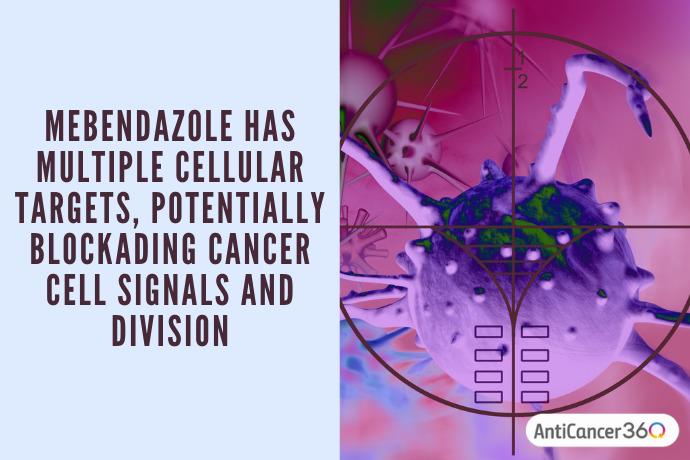
Mebendazole has also been shown to act as a tyrosine kinase inhibitor (TKI). A TKI is a drug or substance that blocks the action of enzymes called tyrosine kinases. Tyrosine kinases play a role in many cell functions, such as cell signaling, growth, and division. These enzymes may be overly active in some types of cancers. So, blocking them with a TKI may help keep cancer cells from growing. In a 2013 study of colon cancer cells, mebendazole was shown to target the following tyrosine kinases: VEGFR2, TNIK, and BRAF [9].
Additionally, mebendazole’s blockage of VEGFR2 signaling can also lead to reduced tumor blood vessel growth (known as an anti-angiogenic effect) as well as decreased pro-inflammatory cytokines [10].
Many chemotherapy drugs and targeted therapies have been developed to block or interfere with many of the same targets as mebendazole. Thus, some experts suggest mebendazole as a potential beneficial add-on to standard oncology treatments []. For example, mebendazole was shown to strongly synergize (enhance) docetaxel-mediated cell killing in a study of prostate cancer cells [12].
Frequently Asked Questions about Mebendazole: Dosages, Side Effects, and Precautions
Next, we’ll answer some commonly asked questions about mebendazole.
How and where can I get mebendazole?
In the United States, mebendazole is only available from pharmacies. So, you’ll need a prescription (Rx) from a licensed healthcare provider.
You may have noticed that some online retailers sell a similar drug called fenbendazole. However, the FDA states that only a veterinarian should order fenbendazole for use in dogs and other animals [13].

We’ll talk more about the potential anticancer effects of fenbendazole in a future blog post—stay tuned!
Is there any evidence to support mebendazole as a cure for cancer?
Unfortunately, there’s no strong evidence that mebendazole can cure cancer. But, several documented case reports in the literature support mebendazole as a repurposed anticancer therapy [14]. Evidence from preclinical studies and small clinical trials have also found anti-cancer benefits. More research is necessary to determine if there is a survival benefit of adding mebendazole to the treatment of late-stage cancer and, if so, who might benefit.
In 2011, a 48-year-old male with metastatic adrenocortical cancer experienced disease progression after exhausting all standard treatment options, including surgery and multiple chemotherapy protocols. He began single-agent treatment with mebendazole 100 mg twice daily and remained stable for 19 months. His disease eventually progressed after 24 months of mebendazole treatment, during which he did not develop any significant side effects [15].
In 2013, short-term complete or partial remission of metastatic lesions was also reported in a 76-year-old male with metastatic colon cancer who took mebendazole 100 mg twice daily for 6 weeks after failing standard treatment options. He experienced elevated liver enzymes and had to pause mebendazole treatment for 3 months, after which he developed additional metastases.
Additionally, there’s promising evidence from preclinical studies (lab studies in mice or human cancer cells) that suggest mebendazole’s anticancer effects in various types of cancer, such as colorectal cancer [16] and brain cancer like glioma or glioblastoma [17].
What is the dosage of mebendazole for cancer?
Since mebendazole is not FDA-approved for cancer, there isn’t a specific dose advised for this purpose. More research is needed to establish an optimal dosage of mebendazole in people with cancer.
Mebendazole chewable tablets come in strengths of 100 milligrams (mg) and 500 mg. The tablet can be crushed and mixed with food if necessary. Taking mebendazole with a high-fat meal increases its bioavailability [18].
The dosage of mebendazole for its FDA-approved indication of treating parasite (worm) infections is 100 mg by mouth once to twice daily for three days [19]. To treat certain parasitic infections, long-term treatment with a higher dosage of 40-50 milligrams per kilogram (mg/kg) per day may be needed [20].
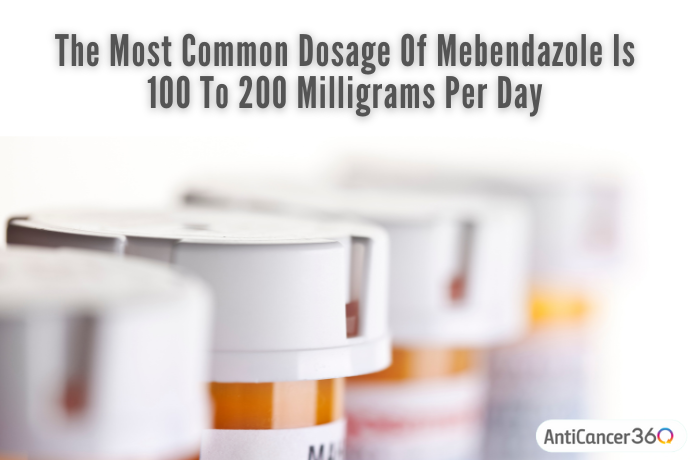
In reports of individuals with metastatic cancer, mebendazole has been used in dosages of 100 mg once or twice daily [21].
High-dose mebendazole plus standard monthly temozolomide (Temodar) was shown to be safe in a small clinical study of people newly diagnosed with high-grade glioma. A dosage ranging from 25 to 200 milligrams per kilogram (mg/kg) of body weight per day for 6 to 12 months was used in this study [22],[23].
In this study, some participants who took the highest dosage of mebendazole developed elevated liver enzymes, a potential sign of liver damage. In these cases, liver enzymes returned to normal after stopping treatment and/or after dose reduction. The researchers involved in this study suggest a reasonable dosage for future trials would be in the range of 75 to 100 mg/kg per day [24].
Be sure to take mebendazole in the dosage that your doctor prescribes.
What are the side effects of mebendazole?
Mebendazole may cause the following common side effects [25]:
- Belly pain
- Diarrhea
- Lack of appetite
- Gas or bloating
- Nausea or vomiting
- Elevated liver enzymes
Although rare, severe skin rashes, convulsions, liver problems, and allergic reactions have been reported with mebendazole use.
Additionally, mebendazole may not be safe for [26]:
- Women who are pregnant or breastfeeding.
- Children younger than two years of age.
- People who’ve had a past allergic reaction to mebendazole.
- People taking another medicine called metronidazole (Flagyl) —Taking mebendazole and metronidazole together may cause severe skin reactions and should generally be avoided [27].
Can you overdose on mebendazole?
According to the FDA, taking too much mebendazole (or taking it for prolonged periods) may lead to [28]:
- Hair loss
- Liver problems, such as hepatitis (inflammation of the liver)
- Low levels of white blood cells
- Kidney damage
- Gastrointestinal upset, such as nausea, vomiting, or diarrhea
Can Mebendazole Help in the Fight Against Cancer?
Overall, you can see that there can be many potential benefits to adding mebendazole to your anticancer program. And when you’re fighting cancer, you want every possible tool in your toolbelt, such as repurposed or “off-label” drugs.
Be sure to discuss the potential benefits and risks of mebendazole with a member of your treatment team. Mebendazole is an Rx-only drug in the United States. If your healthcare provider agrees that mebendazole is safe for you, they may consider prescribing it.
Ultimately, when using an Aggressive Integrative Approach to cancer, the goal is to fight cancer from every possible direction. This practice includes integrating repurposed medications and natural supplements to fight cancer in an evidence-based, safe way that shouldn’t interfere with your oncology treatment.
How are you approaching your cancer treatments? Are you taking any natural or dietary supplements? Have you tried mebendazole or any other repurposed medicines? Have you made any other lifestyle changes that have made a noticeable difference in your fight against cancer? Please feel free to share your experience or feedback in the comments below!
Are You A Good Candidate For Our Program?
If you’d like to learn more about AntiCancer360 and see if we can help you… please watch our free online webinar to learn more about our approach. At the end, you’ll be able to schedule a free call with our team to discuss your case in detail.
Dr. Patricia Weiser is one of AntiCancer360’s consultant pharmacists, science advisors, and medical writers. Her expertise helps us create safe herbal and supplement combinations and avoid potential drug interactions.
Patricia is a graduate of the University of Pittsburgh and a licensed pharmacist. She has clinical experience in both community and hospital pharmacy. She is passionate about integrative and preventative care and strives to empower her patients to take an active role in their health.





